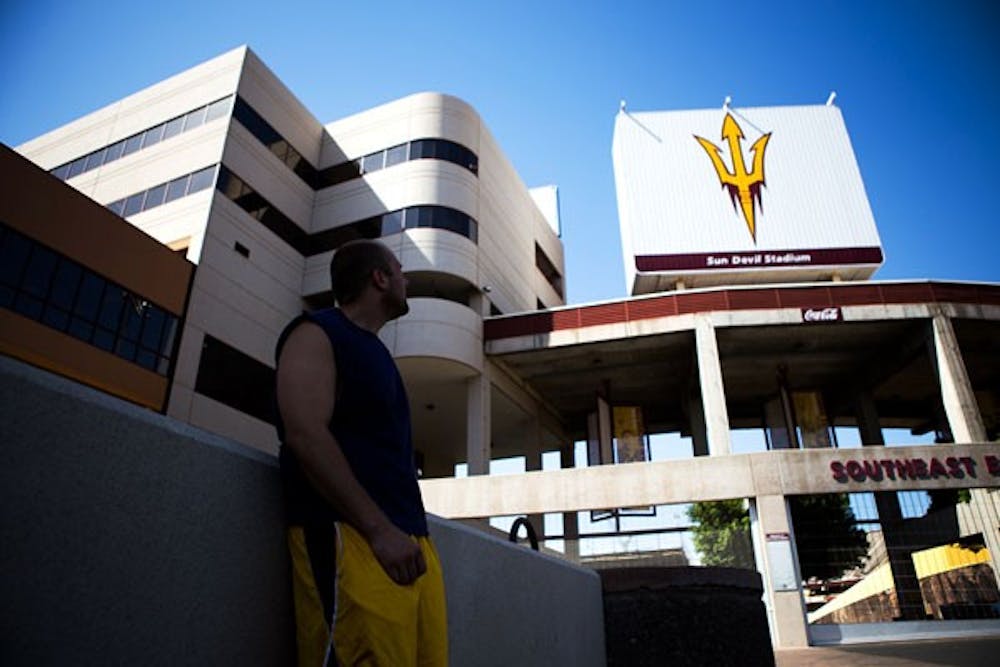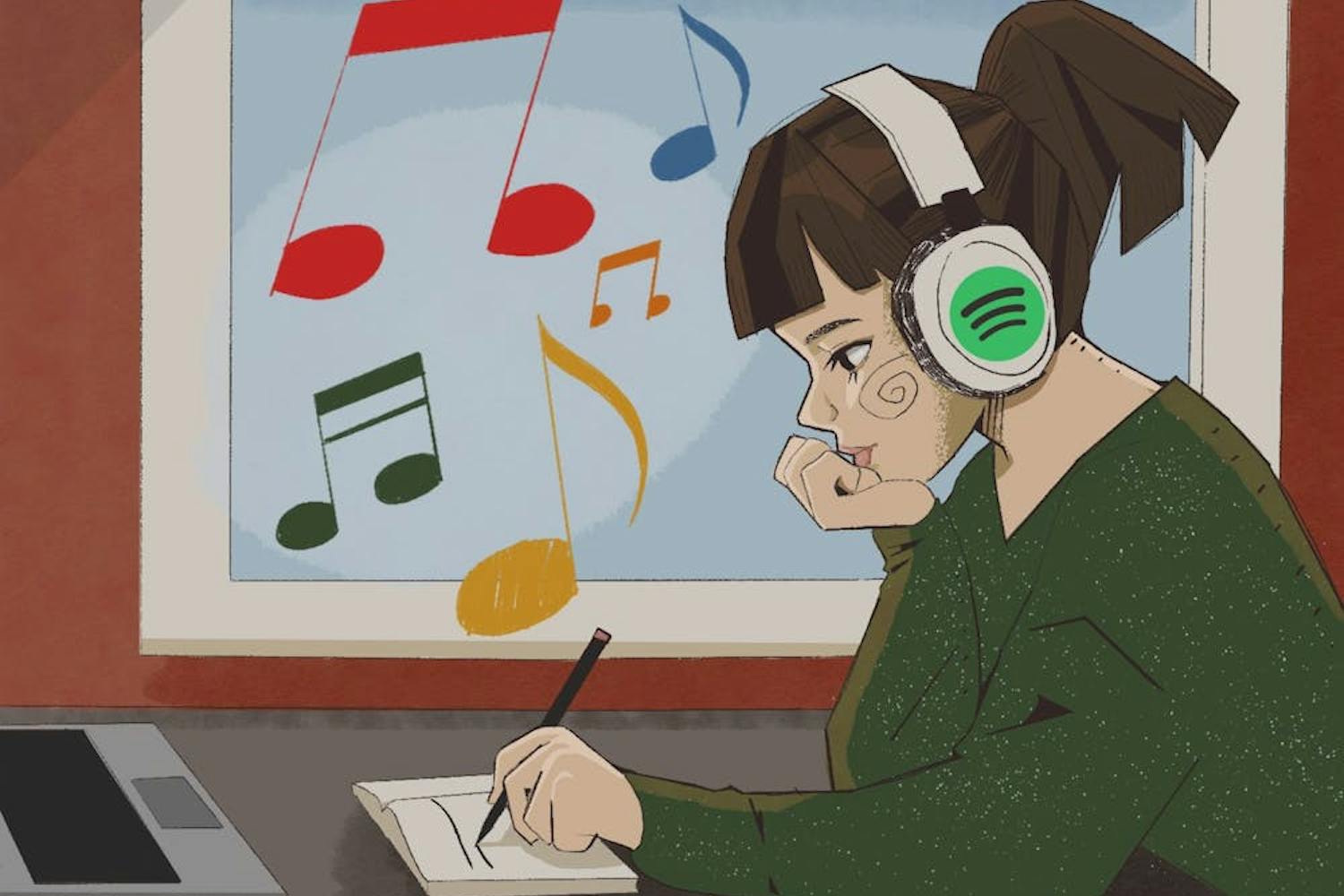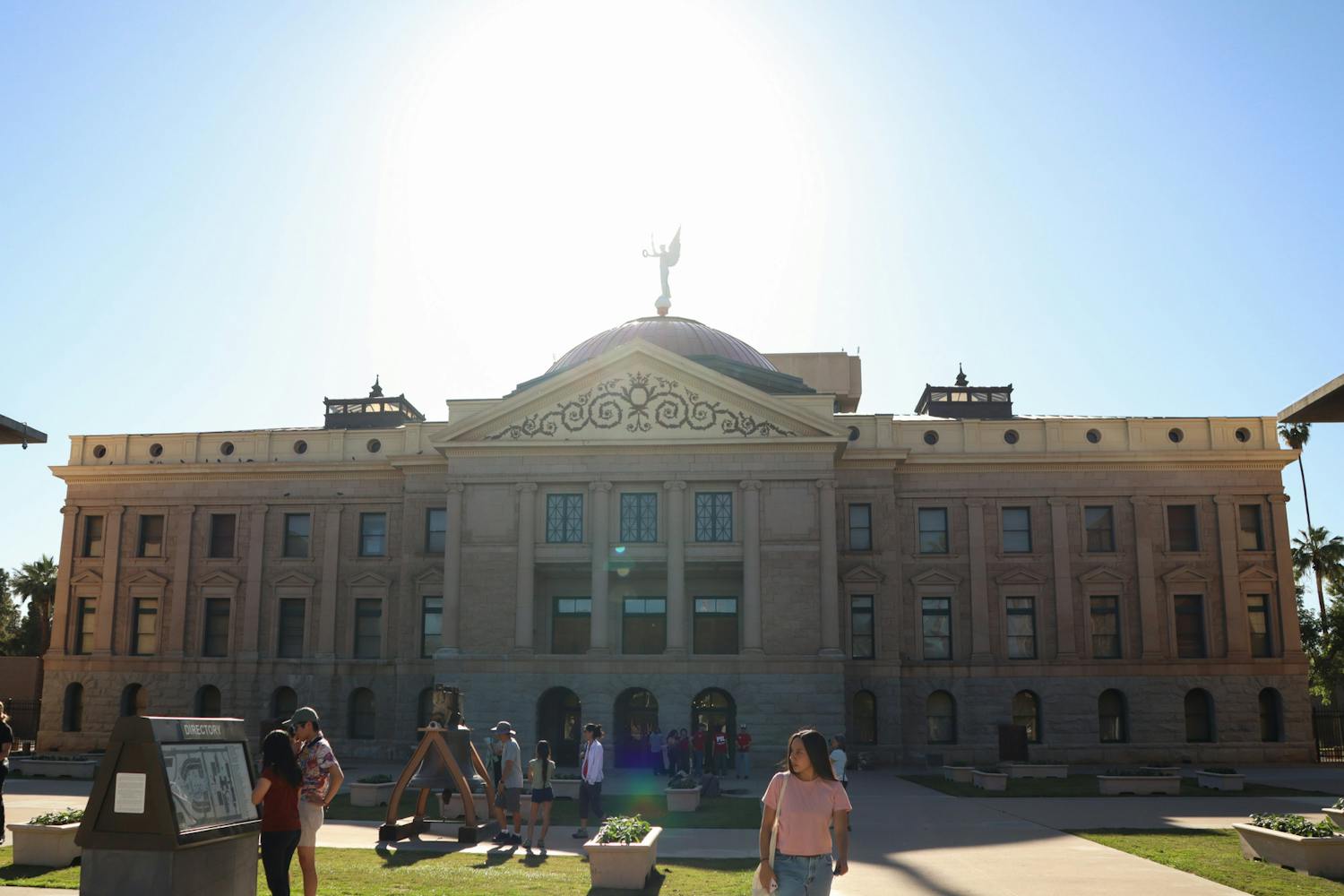 Trevor Papasodora-Beard said he would try again to get back on the football team after finishing 12 credit hours at a community college over the summer. Trevor said he misses the bond between the players during his time on the team. (Photo by Ryan Liu)
Trevor Papasodora-Beard said he would try again to get back on the football team after finishing 12 credit hours at a community college over the summer. Trevor said he misses the bond between the players during his time on the team. (Photo by Ryan Liu)Playing football for a Division I university was a dream come true for former ASU student Trevor Papasodora-Beard, but just when it seemed he'd reached his dream, a nightmare began.
Papasodora-Beard walked onto the the scout team for Sun Devil football in August 2012 and was working hard to move up the depth chart, but a series of bad decisions led to his dismissal from the team in January 2013 after the Sun Devils' bowl game in San Francisco. In April of the same year, he was dismissed from the University.
Raised by his mother in Alaska before moving to Arizona when he was 15, Papasodora-Beard was a typical kid who loved football.
“I moved down here when I was 15 and graduated from Desert Vista High School when I was 16,” Papasodora-Beard said. “I spent the next two years at junior college. I played at Mesa Community College, Phoenix College and continued playing here, and then that is when things started spiraling out of control.”
Papasodora-Beard, who was a communications major, said he really enjoyed his time at ASU and never expected to see any playing time but was just happy he made the team.
During his time on the football team, his life began to unravel.
“We would usually practice in the mornings, and I would go into the facilities, and then around 1 or 2 (p.m.), I’d have class, and it got to the point where we’d practice and go to the facilities and just be hanging out and then just go do something completely different and blow class off,” he said.
Part of the reason for the dramatic downfall was drug use, excessive partying and drinking, Beard said.
“I would show up to practice, meetings, pretty much any time of the day that I could be I would be out of my mind somehow,” Papasodora-Beard said. “Generally, I don’t drink a lot, so it was usually pills or pot or something like that that I could get my hands on.”
The NCAA and ASU administer drug tests to players periodically, but Beard said he always found a way to skip the tests.
“I don’t know how I got away with it, but I had pretty much skipped every drug test they had ever given me,” he said. “Every team test they ever did to me I just walked out of and just didn’t do it.”
Being a scout team player and not a starter allowed him to fly under the radar and not be caught doing drugs or failing his classes, Beard said.
“As far as doing things we’re not supposed to do, a guy like me can get away with it,” he said. “If your starting quarterback skips a drug test, you are going to know about it, but maybe not a guy on the scout team.”
The partying and skipping classes eventually caught up to Papasodora-Beard, and following the bowl game in San Francisco, he was released from the team.
 Trevor Papasodora-Beard, a former ASU football player that was kicked off from the team is now homeless and trying to get back to school in the fall. (Photo by Ryan Liu)
Trevor Papasodora-Beard, a former ASU football player that was kicked off from the team is now homeless and trying to get back to school in the fall. (Photo by Ryan Liu)"I was told in San Francisco that when we returned I would be gone," he said. "So I spent the rest of my days there trying to figure out what I was going to do. When I came back, immediately my one and only plan was to get out of my mind, and I didn’t really have any other plans than that."
Associate athletic director Mark Brand said the reason for Beard's release was because of his play on the field.
"The reason he was removed from our team was because his skill set as a football player wasn’t what we desire for a walk-on," he said. "It was not for anything related to drug use. That is incorrect."
Papasodora-Beard said the official reason for his release was strictly due to his GPA being below the standard for a student athlete.
Papasodora-Beard kept the news to himself about the situation, because he was ashamed.
"I didn't tell my father about it. I didn't tell anyone about it," he said. "I pretty much just kept it a secret, and then down the line it began to come out, and that is when things started to go bad for me in my personal life."
After his father figured out what had happened, he kicked Papasodora-Beard out of his house.
"I stayed at a friend's house for a while and was able to work a job that I had, and then some stuff happened in my personal life again," Papasodora-Beard said. "I was trying to just live the regular life, just working, not going to school and then some stuff happened again. Pot and liquor got a hold of me again, and I ended up losing my apartment two or three months ago."
Since losing his apartment, Papasodora-Beard has been living out of his car and crashing at a friend's house when available.
Papasodora-Beard said he takes full responsibility for his actions but was surprised at the lack of support he received while on the team and after.
"If they're not a guy who is going to be on the field or that guy who doesn’t get noticed immediately, I don’t feel they get a lot of support," he said.
After being released, Papasodora-Beard said he didn't feel he could ask the coaching staff or anyone within the organization for help with his problem.
"I feel like, from what I was told, it was completely cut and dry," he said. "That’s why I didn’t even go to them about the problem because I felt that, in my mind, 'Who the hell am I to them?' because that was pretty much the treatment I received the whole time I was there. They didn’t come to me and say, 'What is going on?' or 'Why is your GPA so low?' They just said, 'This is your GPA: you’re gone.' They didn’t give me any option; they just let me go."
After feeling like he had no support during his time with the team, Papasodora-Beard said he didn't feel like he could ask anyone for help after being released.
"I literally felt that if I went back and asked them for help I would be pushed aside and probably asked to leave," he said. "If I went to them and said, 'I have a drug problem,' or 'This is what is happening in my life,' I don’t think it would have made a difference. If I did think it would have made a difference, I would have gone."
 Trevor Papasodora-Beard spent the last two weeks sleeping at his friend’s place on a mattress. Prior to residing at his friend’s living room, Trevor was living in his car a couple of times a week. (Photo by Ryan Liu)
Trevor Papasodora-Beard spent the last two weeks sleeping at his friend’s place on a mattress. Prior to residing at his friend’s living room, Trevor was living in his car a couple of times a week. (Photo by Ryan Liu)Senior associate athletic director Jean Boyd said the team works proactively to educate student athletes on the dangers of drugs and alcohol.
"We aggressively and proactively educate our student athletes on a number of issues relative to what we would call 'life skills,'" he said. "One of those is decision-making as it relates to substances and what you put in your body, and if you are trying to be a championship performer, certainly alcohol consumption or any other type of drug use or even certain type of supplements can be a hindrance."
If a student fails a mandatory drug test by the University, steps are taken in order to help the student overcome their issues, Boyd said.
"Often times, when someone is regularly using drugs, there may be some family history issues or trauma suffered along the lines somewhere, and there is certainly recreational use as well," he said. "We would try to identify the reason for the use and then implement a program on an individual basis to assist that individual student athlete to maximize their potential and address any issue that would keep them from that."
No support was ever offered to Papasodora-Beard for his academic struggles or problems with substance abuse, he said.
"In all respect to Jean Boyd and them, there was no handout offer of support," he said. "There was no 'You’re off the team, but here is a support group you can go to.' It was 'You’re just off the team.' If you’re a guy that’s not worth a lot to them but can cost them a lot, then they are just going to get rid of you."
Papasodora-Beard is trying to get his life back on track and is planning on enrolling at Mesa Community College over the summer to receive the credits he needs to re-enroll at ASU.
"I was disqualified from the University here and they told me I had to do six credits here or 12 credits at a community college and hopefully be enrolled back here in August," he said.
Papasodora-Beard said he doesn't blame anyone for the problems he faced during his time at ASU and is looking forward to coming back and possibly walking on to the football team again.
"I actually want to come back, and I don’t blame the school, the atmosphere, the people here, the coaching staff or the officials or anybody," Papasodora-Beard said. "It was all my fault, and I really like this place. What I actually wanted to do was to come back here and try to walk back on to the team. I do want to play ball again, so my plan was to enroll back here and walk on to the team in August, and if they don’t take me, I’m just going to go somewhere else and play."
 In return for his friend’s kind hospitality for allowing Papasodora-Beard to live in the living room, he volunteers to do the house chores and clean the house pool. This is one skill that he learned while being homeless, bouncing around at his friends’ house. (Photo by Ryan Liu)
In return for his friend’s kind hospitality for allowing Papasodora-Beard to live in the living room, he volunteers to do the house chores and clean the house pool. This is one skill that he learned while being homeless, bouncing around at his friends’ house. (Photo by Ryan Liu)He said coming out about this issue was difficult, and he wants other players to learn from his experiences.
"You hear stories like this all of the time in movies and stuff like that, but when it happens to you in real life, it is something different," he said. "I want to help stop athletes from going down the path I did, because you walk into it, and you think you can handle it, but it eventually it turns into a lifestyle and gets ridiculous."
Reach the reporter at jshanco2@asu.edu or follow him on Twitter @joey_hancock




